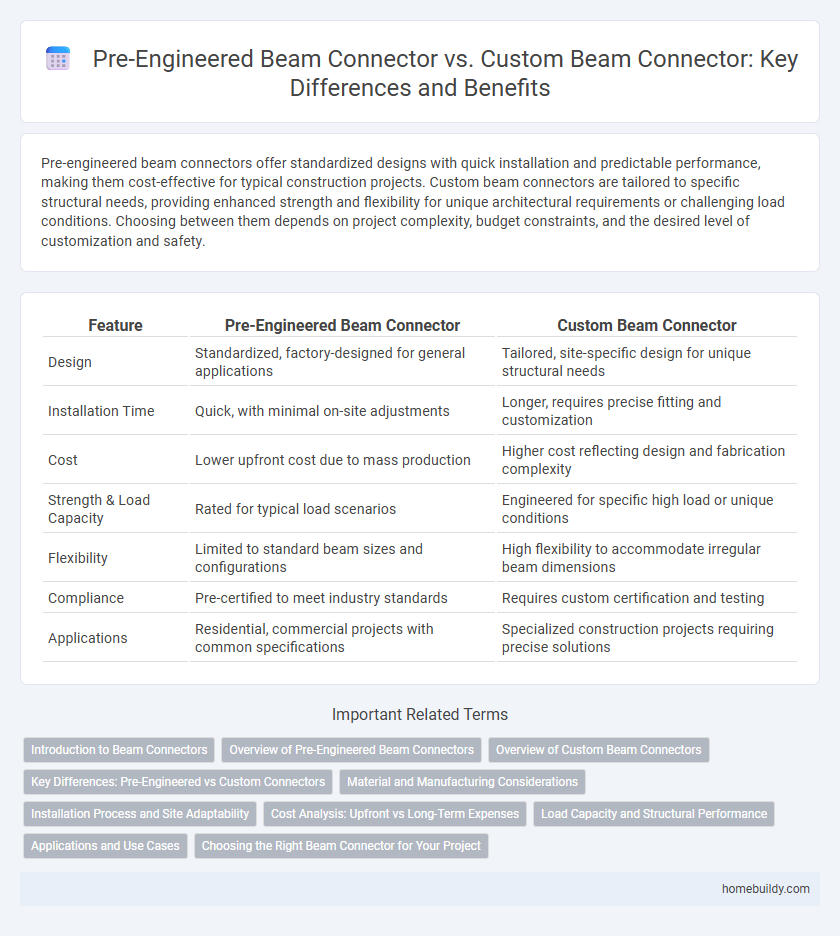Pre-engineered beam connectors offer standardized designs with quick installation and predictable performance, making them cost-effective for typical construction projects. Custom beam connectors are tailored to specific structural needs, providing enhanced strength and flexibility for unique architectural requirements or challenging load conditions. Choosing between them depends on project complexity, budget constraints, and the desired level of customization and safety.
Table of Comparison
| Feature | Pre-Engineered Beam Connector | Custom Beam Connector |
|---|---|---|
| Design | Standardized, factory-designed for general applications | Tailored, site-specific design for unique structural needs |
| Installation Time | Quick, with minimal on-site adjustments | Longer, requires precise fitting and customization |
| Cost | Lower upfront cost due to mass production | Higher cost reflecting design and fabrication complexity |
| Strength & Load Capacity | Rated for typical load scenarios | Engineered for specific high load or unique conditions |
| Flexibility | Limited to standard beam sizes and configurations | High flexibility to accommodate irregular beam dimensions |
| Compliance | Pre-certified to meet industry standards | Requires custom certification and testing |
| Applications | Residential, commercial projects with common specifications | Specialized construction projects requiring precise solutions |
Introduction to Beam Connectors
Beam connectors play a crucial role in structural engineering, linking beams securely to columns or other structural elements. Pre-engineered beam connectors offer standardized dimensions and load ratings, providing ease of installation and consistent performance in typical construction scenarios. Custom beam connectors are tailored to unique project specifications, accommodating unusual load requirements or architectural designs that standard connectors cannot fulfill.
Overview of Pre-Engineered Beam Connectors
Pre-engineered beam connectors offer standardized solutions designed for quick installation and consistent performance in structural applications. These connectors are manufactured according to industry specifications, ensuring reliability and ease of integration with commonly used materials and building systems. Their pre-fabricated nature reduces fabrication time and labor costs compared to custom beam connectors, which require tailored designs and specialized installation.
Overview of Custom Beam Connectors
Custom beam connectors offer tailored solutions designed to meet specific project requirements, providing enhanced compatibility with unique structural designs. These connectors are engineered to accommodate unusual load conditions, complex geometries, and specialized materials, ensuring optimal performance and safety. Their bespoke nature allows for precise integration within architectural and engineering frameworks, often resulting in improved structural integrity compared to pre-engineered alternatives.
Key Differences: Pre-Engineered vs Custom Connectors
Pre-engineered beam connectors offer standardized designs optimized for common load conditions, ensuring faster installation and lower costs, while custom beam connectors are tailored to specific structural requirements, providing flexibility for unique architectural designs and complex load paths. Pre-engineered options use tested and approved models that streamline manufacturing and quality control, whereas custom connectors involve detailed engineering analysis and fabrication, accommodating irregular geometries and non-standard materials. The choice between pre-engineered and custom connectors impacts project timelines, budget constraints, and structural performance criteria.
Material and Manufacturing Considerations
Pre-engineered beam connectors typically use standardized steel grades and automated manufacturing processes like stamping or casting to ensure consistent quality and cost-efficiency. Custom beam connectors allow for tailored material selection such as high-strength alloys or corrosion-resistant coatings, enabling optimized performance for specific structural requirements. Manufacturing considerations for custom connectors often involve specialized fabrication techniques such as CNC machining or welding to meet unique design specifications.
Installation Process and Site Adaptability
Pre-engineered beam connectors streamline the installation process with standardized components that reduce on-site adjustments and labor time, enhancing efficiency. Custom beam connectors offer superior site adaptability by accommodating unique structural requirements and irregular geometries, allowing tailored fits in complex projects. Site adaptability with custom connectors minimizes retrofit complications, while pre-engineered options excel in repeatable, large-scale construction environments.
Cost Analysis: Upfront vs Long-Term Expenses
Pre-engineered beam connectors typically offer lower upfront costs due to standardized manufacturing and mass production efficiencies, reducing initial investment for common structural applications. Custom beam connectors, while more expensive initially, provide tailored solutions that can minimize long-term expenses by optimizing material usage and installation time for unique project requirements. Evaluating total cost of ownership involves balancing the predictable pricing of pre-engineered options against the potential savings in labor and durability a custom connector may provide over the structure's lifespan.
Load Capacity and Structural Performance
Pre-engineered beam connectors offer standardized load capacity ratings backed by rigorous testing, ensuring predictable structural performance across typical applications. Custom beam connectors provide tailored load capacities specifically designed to meet unique project requirements, optimizing structural integrity for complex or non-standard configurations. Choosing between the two depends on balancing the efficiency of pre-engineered solutions with the precision and enhanced performance of custom-engineered connectors.
Applications and Use Cases
Pre-engineered beam connectors are widely used in standard construction projects such as residential buildings, commercial frameworks, and modular assembly due to their cost-effectiveness and ease of installation. Custom beam connectors are preferred in specialized applications like industrial facilities, heavy load-bearing structures, and architectural designs requiring unique load distributions or non-standard geometries. The choice between these connectors hinges on project complexity, load requirements, and the need for tailored performance in structural integrity.
Choosing the Right Beam Connector for Your Project
Pre-engineered beam connectors offer standardized quality and quicker installation for common structural applications, making them cost-effective and reliable for typical construction needs. Custom beam connectors provide tailored solutions designed to meet unique project specifications, ensuring optimal performance and compatibility with specialized architectural requirements. Selecting the right beam connector depends on project complexity, load requirements, and budget constraints, balancing efficiency with customization to achieve structural integrity.
pre-engineered beam connector vs custom beam connector Infographic

 homebuildy.com
homebuildy.com